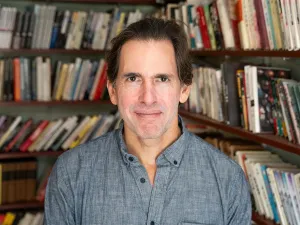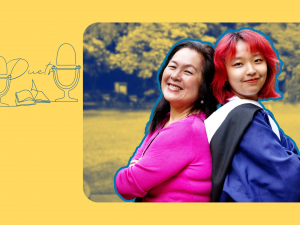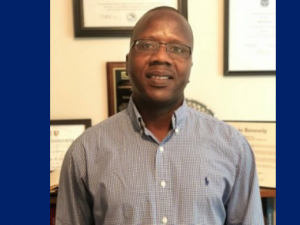AMES Postdoc Brings Expertise in Contemporary Israeli-Hebrew Poetry and Fiction

The Department of Asian and Middle Eastern Studies (AMES) welcomes Reut Ben-Yaakov, postdoctoral associate in Israeli culture, to its faculty for the academic year.
Ben-Yaakov holds a Ph.D. in Hebrew literature from the Hebrew University of Jerusalem. Along with teaching three courses, she will take part in scholarly events and activities, conduct research and work on her publication portfolio.
“Ben-Yaakov brings an expertise in contemporary Israeli-Hebrew poetry and fiction to AMES that complements our faculty research on the earlier part of the 20th century,” explains Shai Ginsberg, chair and associate professor of the department.
Her research on Israeli poetry is groundbreaking, and Ginsberg hopes students will take advantage of the opportunity to learn about not only current poets and their work but also new approaches in the study of poetry.
“Ben-Yaakov is an important translator of both poetry and fiction into Hebrew,” he says.
“She joins an already robust cluster of AMES faculty and students who work as translators; AMES has become the primary place on campus for those interested in the practice of and scholarship on translation.”
We sat down with Ben-Yaakov to discuss her research and her plans while she’s at Duke.
What is your research focus while at Duke?
During this academic year, I aim to finish my book manuscript based on my dissertation, “‘It Took Me Twenty Years to Love’: Israeli Poetry in the 1990s,” which focuses on nine poets and provides an historiographical point of view of Hebrew poetry in the 1990s, and the poet-critic power relations.
In addition, I am focusing on my new project, “’But I Belong to Muslim Europe’: The Historical Imaginary of Spain and the Sephardic in Hebrew Literature Since the 1990s.”
Why did you choose Duke?
I like the departmental structure of AMES, where Hebrew and Israel studies are attached to its Asian Middle Eastern surroundings and context. Surprisingly, this context is constantly overseen, and I find it both meaningful and fascinating as an academical scholarly position.
What brought you to your research?
One of my main interests as a researcher is to question discipline itself and its role in the academic and political fields. My current book project focuses on a period which is traditionally considered a low point for Hebrew poetry. In it, I discuss poets who published their debut poetry volumes during this decade and the cultural atmosphere in Israel in the 1990s.
My study seeks to turn to what seems absent, or less important, and ask questions about what has gone unheard — to listen and characterize, and to wonder what kept it from being heard.
I believe that a profound feminist critical approach is at the base of many aspects in my life, including my research interests. Hence, I take interest in shedding light on the lesser seen or heard, and I also try to search for the understanding of the circumstances that are in effect — what power structures constantly prevent things from being heard.
What are you looking forward to during your time at Duke?
So many things! First and foremost, it is always the meeting with new people from different fields of research that is the most intriguing and exciting for me, and the new thoughts it provokes. This is already happening, and I am grateful for that.
I am also excited about the academical and unacademical events that take place here, many planned visits by scholars and artists, and, of course, teaching here which is a wonderful experience that teaches me a lot, as well.




